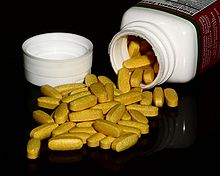 Can popping a vitamin pill help cure mental health problems? For people who lack vitamin B and show symptoms of mental illness as a result, this may be the case.
Can popping a vitamin pill help cure mental health problems? For people who lack vitamin B and show symptoms of mental illness as a result, this may be the case.
All of the B group vitamins affect brain function, mental sharpness and mood. Research shows that folate and vitamins B6 and B12 might be particularly vital. Some studies show a link between memory problems and Alzheimer’s disease in the elderly and low levels of B12, for example.
Mild deficiencies of B vitamins can badly affect mental health. Severe deficiencies are linked to serious mental illnesses such as severe depression.
This article discusses vitamins B6, B12 and folate.
What are the B vitamins?
Increase serotonin with vitamin B6
Feel good with folate
Boost B12 for brain health
What are the B vitamins?
Below is a list of the B vitamins with other names they are called.
- Vitamin B1 (thiamine)
- Vitamin B2 (riboflavin)
- Vitamin B3 (niacin and nicotinamide)
- Vitamin B5 (pantothenic acid)
- Vitamin B6 (pyridoxine, pyridoxal and pyridoxamine)
- Vitamin B7 (biotin and vitamin H)
- Vitamin B9 (often called folic acid (a synthetic version of vitamin B9), folate (naturally occurring vitamin B9) and, sometimes, vitamin M)
- Vitamin B12 (various cobalamins, often called cyanocobalamin in vitamin supplements)
Increase serotonin with vitamin B6
Vitamin B6 is needed to make most of the brain’s neurotransmitters, including serotonin. These chemicals are vital for happiness.
What are some symptoms of lack of vitamin B6?
- Depression
- Nervousness
- Irritability
- Acne
- Abnormal brain wave pattern and conduction of nerve impulses
- Convulsive seizures (fits)
- Dermatitis
- Flaky skin
- Immune system problems – problems forming antibodies
- Poor dream recall
- Insomnia (sleeplessness)
- Lack of energy
- Muscle tremors, cramps and/or weakness
- Dizziness
- Tingling hands
- Water retention
Who is most at risk of having low levels of vitamin B6?
- People who often drink high levels of alcohol
- Women on the birth control pill, especially the pill with estrogen
- People with diabetes
- Elderly people
- Women who are pregnant or breastfeeding
- People with a malabsorption problem, such as lactose intolerance or celiac disease
- People with vitamin B6 dependent syndromes
- People with kidney failure
- People with thyroid disease (overactive thyroid gland)
- People taking medications that inactivate vitamin B6
What foods are good sources of vitamin B6?
Good sources of vitamin B6 include:
- Vegemite
- walnuts
- bananas
- lamb’s liver
- chicken
- egg yolks
- potatoes
Feel good with folate
Folate is important to stay alert, be happy, focus well and have a good memory. It helps the body lower blood levels of homocysteine. This is important because too much of this chemical can damage brain cells.
What are some symptoms of lack of folate?
- Depression
- Anxiety
- Tension
- Diarrhea
- Poor memory
- Cracked lips
- Eczema
- Lack of energy
- Weakness
- Poor appetite
- Prematurely greying hair
- Stomach pains
- A red and inflamed tongue
- Very pale skin
Who is most at risk of having low levels of folate?
- Women on the birth control pill
- People who often drink a lot of alcohol
- Pregnant women
- Young people whose diet is mainly junk food
- Elderly people in institutions
- People with malabsorption syndromes
- People with gastrointestinal (gut) diseases
- People on certain medications, such as the antitumor drug methotrexate, antimalarial drug pyrimethamine, antibiotic trimethoprim, sedatives and barbituates
What foods are good sources of folate?
Foods high in folate include:
- cabbage
- lamb’s liver
- spinach and other green leafy vegetables
- breakfast cereals with folate added
- peanuts
- peas
- egg yolks
Boost B12 for brain health
Vitamin B12 has a number of roles including helping form the fatty covering, called the myelin sheath, around nerve cells. The myelin sheath must remain intact for the nerves to work properly. Low levels of B12 in the body can badly affect this sheath, which can become undone. This means nerve impulses won’t be sent properly, so we can’t think as well as we should.
Some senior citizens absorb little vitamin B12 from their food, so are deficient in this nutrient. A lack of vitamin B12 can present similar signs to Alzheimer’s disease, so what is thought to be to aging or mild strokes can sometimes be caused by a lack of this key vitamin. In such cases supplements of vitamin B12 have reversed the symptoms.
What are some symptoms of lack of vitamin B12?
- Anxiety
- Depression/low mood
- Tension
- Irritability
- Mental slowness
- Memory loss
- Dementia
- Nerve damage
- Feeling too tired
- Weakness
- Tender or sore muscles
- Tingling and/or stiff arms and legs
- Constipation
- Stomach pain
- Eczema or dermatitis
- Mouth over sensitive to hot or cold
- Sore tongue
- Poor hair condition
- A tendency to bleed
- Loss of appetite
- Weight loss
- Pale skin
- Lemon yellow skin color (a sign of severe lack of vitamin B12)
Who is most at risk of having low levels of vitamin B12?
- Strict vegetarians (vegans) because vitamin B12 is only found in animal foods
- Women who are pregnant or breast feeding
- Newborn infants of vegan mothers
- People who often drink high amounts of alcohol
- Elderly people
- People with methylmalonic acidaemia, which is an inherited defect in vitamin B12 metabolism
What foods are good sources of vitamin B12?
Only animal products contain vitamin B12. The following foods are good sources of vitamin B12:
- lamb’s liver
- sardines
- oysters
- egg yolks
- fish
Summary
B vitamins are vital for happiness. Ensure you get enough of them to avoid symptoms of mental illness that might actually be signs of vitamin B deficiency.
written by Nyomi Graef
updated 15 October, 2012
References:
Berkson, B et al., 2005, User’s Guide to the B-Complex Vitamins, Laguna Beach, USA: Basic Health Publications
Bratman, S, 1998, The Alternative Medicine Ratings Guide, Rocklin, USA: Prima Health
B vitamins, 2009, Wikipedia,
http://en.wikipedia.org/wiki/B_vitamins
Folate, 2009, Office of Dietary Supplements, National Institutes of Health,
http://ods.od.nih.gov/factsheets/Folate-HealthProfessional/
Holford, P, 1992, Optimum Nutrition, London, UK: ION Press
Reavley, N, 1999, The New Encyclopedia of Vitamins, Minerals, Supplements, and Herbs: A Completely Cross-Referenced User’s Guide for Optimal Health, New York, USA: M. Evans & Company
Somerville, R (Ed.), 1997, The Alternative Advisor, Virginia, USA: Time-Life
Vitamin B, 2009, Better Health Channel, State Government of Victoria,
http://www.betterhealth.vic.gov.au/bhcv2/bhcarticles.nsf/pages/Vitamin_B
Vitamin B6, 2009, Office of Dietary Supplements, National Institutes of Health,
http://ods.od.nih.gov/factsheets/VitaminB6-HealthProfessional/
Vitamin B12, 2009, Office of Dietary Supplements, National Institutes of Health,
http://ods.od.nih.gov/factsheets/VitaminB12-HealthProfessional/
Wahlqvist, ML, (Ed.), 1988, Food and Nutrition in Australia (3rd ed.), Melbourne, Australia: Thomas Nelson

 July 15th, 2009
July 15th, 2009  Nyomi Graef
Nyomi Graef  Posted in
Posted in  Tags:
Tags: 

Food play very important role in boosting one’s metabolism, mental disposition and mood swings. For example, bananas and sweet potatoes are rich in potassium, ginkgo biloba helps in blood supply to the brain, dark chocolate that is rich in theobromine also acts as a stimulant for the nerves. For more details on it, refer http://www.zippy-health.com/foods-to-bolster-vigour-and-mood-part-ii/
[…] Best B vitamins to boost mood, brain power and happiness | Extra … […]
Your brain is debatably the most significant organ in your entire body. Take good care of it by adhering to the fundamentals: consume more vegetables, limit your sugar intake and exercising. Basic. That is what the latest research presents. No require for expensive supplements.
Hi, thanks so much for these tips! My blogs usually do bring readers and responses. One thing I do is engage with the readers. Answer questions in responses and make clarifications where needed. I think they appreciate that I take the time to talk to them.
Vitamin B12 has been proven to reduce the risk of both heart attacks and stroke. There are many reasons besides this, though, why B12 is such an important vitamin to include in your daily diet regimen to help maintain overall good health. Vitamins play an important role in our daily life.
What can one take to gain brain or memory power?
Hi Shilula,
There are many different supplements people can take to help improve their brain/memory. People vary in regards to which ones work best. I recommend talking with a relevant health professional before taking supplements, because sometimes supplements can worsen some health problems and/or interact with, for example, other supplements and medication people are taking, so cause bad effects on the body.
Supplements that can help improve memory/the brain include:
B vitamins (like the above blog post discusses)
vitamins A, C, D and E
omega-3 fat
magnesium
ginkgo biloba
brahmi
lecithin
amino acids, such as L-tyrosine and L-glutamine
Remember that many supplements are not a quick-fix, possibly taking days, weeks or months to have a positive effect. How long a supplement takes to work depends on lots of factors, such as how severe the health problem is, how long the person has had the health problem, the type of supplement and dosage.
Thanks for visiting my website and commenting.
Kind regards,
Nyomi
Looks like eczema, itches like eczema… but is this eczema? I get this horrible, scaly rash on my hands, that was diagnosed as eczema. It’s usually on the sides and tops of my fingers and in between. Little clear “tapioca” like bumps. Odd thing though is that they are brought on by the sun, and when they were first diagnosed, I was told that sun is supposed to help! What could this be? (not scabies, either) It comes in conjunction with swollen lips and hives brought on by sun exposure.
Hi Matthews,
Thanks for commenting. I recommend that you do a search on the Internet to try to find the type of rash that you have. Some websites have photos of various skin problems, to help people find the type that they have, so they can get the appropriate treatment.
There are many reasons for rashes, including reactions to pet hair, pollen, perfumes, plants, washing powders, make-up or household cleaning products.
Sorry, I don’t know the type of rash that you have. See a relevant health professional, e.g. a dermatologist, medical doctor, pharmacist and/or qualified naturopath, if you feel the need. There are many soothing creams, ointments, oils, herbal products, etc available for rashes – some better than others.
I hope you find a cure soon.
Best wishes,
Nyomi
People at risk – those with eating disorders.
These vitamins are also associated with hair growth